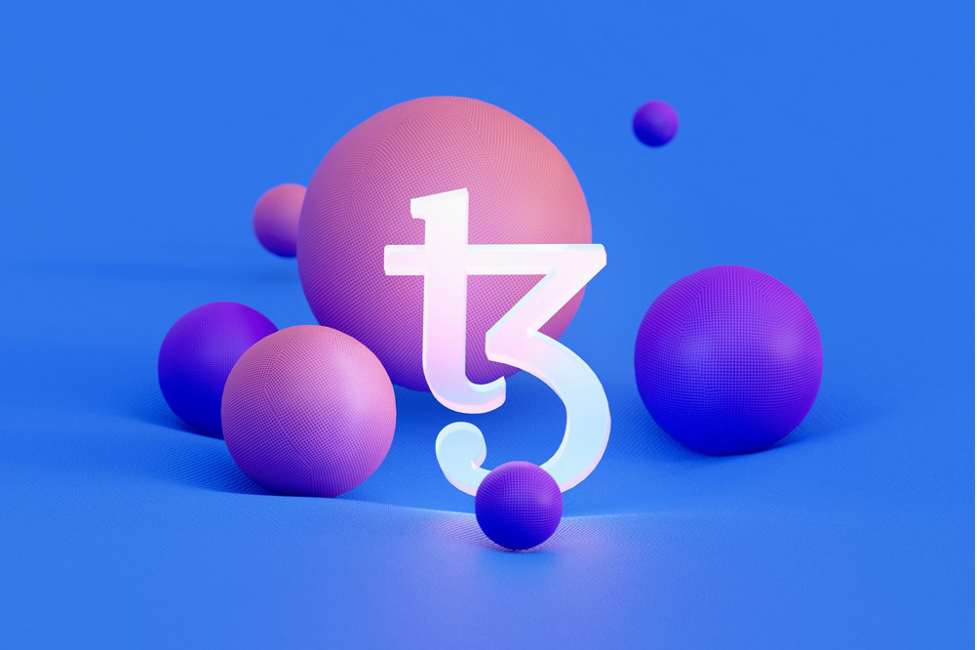Ethereum has long reigned as the most popular smart contract platform. Thousands of dApps are running on it, allowing users to play crypto gambling games on the best crypto casino, take out cryptocurrency loans, or stake their crypto for rewards. On the other hand, Ethereum has battled to scale its network. Developers must compete with high gas fees and slow execution times. Ethereum has tried introducing Ethereum 2.0 with Proof-of-Stake, but changes to the network take some time. It turns out that Tezos is an answer to Ethereum’s issues. It has a novel Proof-of-Stake protocol and allows users to earn rewards by being validators (bakers) or delegating their stake to validators. Let us look at what baking crypto with Tezos is and whether baking or delegating is worth it.
What Is Tezos?
Tezos is an answer to the scalability and upgrade issues of Bitcoin and Ethereum. The creators of the Tezos blockchain, Arthur and Kathleen Breitman, began development on the project after seeing how poorly blockchains handled upgrades. Most notably, the Ethereum Decentralised Autonomous Organisation (DAO) could not successfully implement network changes without being victim to cyber-attacks.
This led the Breitmans to revisit the security of consensus mechanisms and protocol changes related to blockchain technology. Accordingly, they created the world’s first self-amending blockchain. This multi-protocol blockchain can amend itself without the need for hard forks. It is also a native Proof-of-Stake blockchain. This makes it environmentally friendly compared to Proof-of-Work blockchains like Bitcoin.
Furthermore, it is an open-source blockchain. This means there is no dedicated development team; any developer can contribute and build their ecosystems using the Tezos network. Moreover, each Tezos upgrade requires consensus from the entire community. Validators (Bakers in Tezos) must make protocol proposals and receive enough votes from the community to implement a network-wide change. These validators also set a price for their contribution to the network. Once the community approves the proposal, the validator receives compensation. Those that validate blocks and participate in on-chain governance receive rewards for baking crypto and voting on proposals.
How Does It Work?

The Tezos blockchain has a network shell that gives it its self-amending functionality. The developers wrote the source code in the OCaml language. This allows developers to create modules that can amend the network’s protocols. The shell identifies blocks, transactions, and protocols. It ensures that each part of the network can communicate effectively and work in conjunction.
Furthermore, it combines consensus mechanisms and transaction protocols. This combination, known as the blockchain protocol, houses the collection of amendments to the Tezos network. Each participant in the blockchain protocol can propose and execute amendments without affecting the stability of the network shell (the Tezos network as a whole).
Moreover, the Tezos network has a formal verification system that prevents faulty smart contracts, bad actors, and buggy code. This ensures that decentralised applications (dApps) meet the network’s standard of security and useability. Lastly, for effective baking crypto, you need to know the technology behind the Tezos network.
Liquid Proof-of-Stake
Additionally, the Tezos network differentiates itself from other blockchain networks with its consensus mechanism. Liquid Proof-of-Stake (LPOS) has several advantages over other PoS networks. Firstly, it does not require a set number of validators. Users do not need to become validators to participate in on-chain governance. They can delegate their Tezos coins (tez) to validators. In turn, validators receive rewards when they upgrade the network. This means they receive compensation for running the network (block production) and upgrading it (proposing and executing new protocols). Next, delegators retain ownership of their coins and receive a portion of block rewards. The consensus algorithm has changed since the Tezos network launched, and it has five parts.
Baking Crypto
The first part entails block creation. Validators or bakers need to validate a block based on how many rolls they have on the network. A roll is 8000 tez. Participants need a minimum of one roll to validate blocks. The consensus protocol uses a random priority list to determine which baker can validate the next block on the chain.
Endorsing
Bakers can also endorse blocks chosen for validation. At each new block height, the protocol determines 32 random rolls for endorsing. An endorsement is a vote on a block a baker deems fit for validation. The more endorsements a specific block has, the healthier the new chain is.
Block Delay
The consensus protocol also includes a time limit for block validation. This limit depends on the block’s priority and its number of endorsements. The higher the priority and number of endorsements, the quicker the next block can undergo validation (baking). The current block delay limit is 60 seconds.
Fork Choice
If a baker receives two blocks during their validation process, they must choose the correct block using the fork choice rule. It dictates that the baker must choose the longest chain between the two. The rule also ensures that the network includes the more mature chains.
Rewards
Bakers receive tez rewards for baking and endorsing blocks. Currently, the reward percentage fluctuates with the block’s priority level. The higher the priority, the higher the reward. Bakers and endorsers must also include a security deposit when performing these tasks. These are 512 tez for baking and 64 tez for endorsing.
On-chain Voting
The Tezos network also has a novel method for on-chain governance. It follows a 4-stage process that involves bakers. The first stage, proposal, involves bakers voting on proposed changes by other bakers. The proposals with the highest votes and at least a 5% quorum move on to the next stage. The second stage, exploration, allows bakers to vote on the top-ranked proposal from the proposal phase. Here bakers can either vote for, against or abstain. The third stage, testing, includes the creation of a testnet with the proposed changes to the network. It runs for 48 hours alongside the mainchain. The fourth stage, promotion, is a discussion about the proposals using off-chain platforms and considering their testnet performance. Bakers again use the on-chain voting mechanism. The final stage, adoption, allows time for developers to finetune the proposal’s code and add it to the network.
Tezos Coin

As a reward for baking crypto on Tezos, bakers and delegators receive tez rewards. The Tezos network is cryptocurrency before being a smart contract platform. This means that the network’s design emphasises using tez as a mode of payment in various contexts. The platform’s self-amending functionality allows low fees, fast transaction speeds, and low energy consumption. More importantly, without hard forks, the network experiences little downtime and can upgrade without hiccups. The tez is currently worth $2.87 and has a market cap of over $2.5 million.
Tezos Baking Crypto
Of course, one of the essential uses for tez on the Tezos network is its role in baking crypto. Bakers need to stake 8000 tez. They also need to run a full node of the Tezos blockchain and have exceedingly high uptime. When baking crypto, interested parties need technical knowledge about managing blockchains. They are responsible for reporting bad actors and ensuring the smooth operation of the network. Furthermore, they need to vote on new proposals for the network. Bakers can earn 16 tez per block they add to the network.
Advantages
The main advantage of being a baker includes having a vote on the future of the network. This means that bakers like Ubisoft and other global teams can vote on multiple proposals and earn rewards as the network grows with more dApps. Lastly, bakers open their rolls to delegates. Here delegators stake their tez with the baker and earn a portion of block rewards. The baker can charge a commission on rewards with no commission limit.
Disadvantages
Baking requires technical expertise and lots of time. Bakers need to endorse and validate blocks every three days and be online most of the day. Accordingly, this might not be possible for many people. Being a baker also requires an 8000 tez stake. This means that a baker needs to have an eye for development. It is not profitable only to be a baker.
How To Start Baking Crypto

To become a baker, you need a mid-sized server, lots of disk space, and an SSD hard drive. The SSD ensures that your computer can handle the Tezos network’s speed. Once you purchase 8000 tez, you can sign up on BakeChain. This service allows bakers to use a light version of Tezos. Bakers on this platform only need to install the Bakechain software and follow the instructions. After installing the software, you must connect your Tezos wallet to the desktop client. Next, the application will assign your baking slots. You need to remain online during these times because you lose your baking rewards if you are offline. Lastly, you need to wait for seven cycles before you can start onboarding delegators. You can charge between 10 and 15% as a commission.
Tezos Delegating
Delegating is an attractive option for participants who do not want to dedicate their time to running a node but still participate in baking crypto. Firstly, you need to create a Tezos wallet. You can choose between several software or hardware wallets. Next, you need to research a prospective baker to delegate to. You can look at the Tezos explorer and check which delegators have lower commission fees and high uptime. You also need to look at the baker’s payout amounts and periods, the minimum delegation amount, and when you receive your first payout. This can take between 35-40 days. Lastly, you need to choose a delegation service. You could use several delegating services like Atomex or straight from your wallet.
Advantages
Delegating your tez does not require handing over custody of your crypto to a service. You hold onto your tez and still receive rewards. They are less than baking but require much less effort. Lastly, you can delegate as low as one tez. This means you can scale your stake as you receive rewards instead of making a large 8000 tez investment.
Disadvantages
One downside is that delegators have no control over rewards. They need to rely on bakers to send their rewards after each validated block. This means that there is a possibility that a baker might neglect to payout rewards. Finally, as a delegator, you need to pay a commission fee to lower your rewards.
How To Delegate
Delegating your tez only involves opening your Tezos-supported wallet and choosing to delegate from a list of bakers. Keep in mind that you need to check whether a baker is trustworthy. Selecting a baker active in the Tezos governance process is a good idea. They are usually more consistent with their reward payouts.
Which Is Worth It?
Baking crypto with Tezos allows an aspiring developer or crypto enthusiast to shape the future of a self-amending blockchain project. Moreover, bakers receive more rewards and do not have to wait over a month for their payouts. Bakers also receive commission income from their delegators. This can lead to rewards of over 20 tez per block. However, baking requires consistent uptime, and they must manually payout delegator rewards. It is a hands-on method of earning crypto. Ultimately, delegating is worth it. It has a low barrier of entry, and it does not require you to lose custody of your tokens. You might have to pay a commission, but the payout does not require much effort.
Final Thoughts
Baking crypto on the Tezos network opens crypto users to an open-source community dedicated to improving blockchain technology through decentralisation. Its on-chain governance makes it more secure than blockchains that rely on off-chain voting and proposals. Baking and delegating each have their advantages but delegating has the higher return on investment given the low barrier of entry and ease of use.















